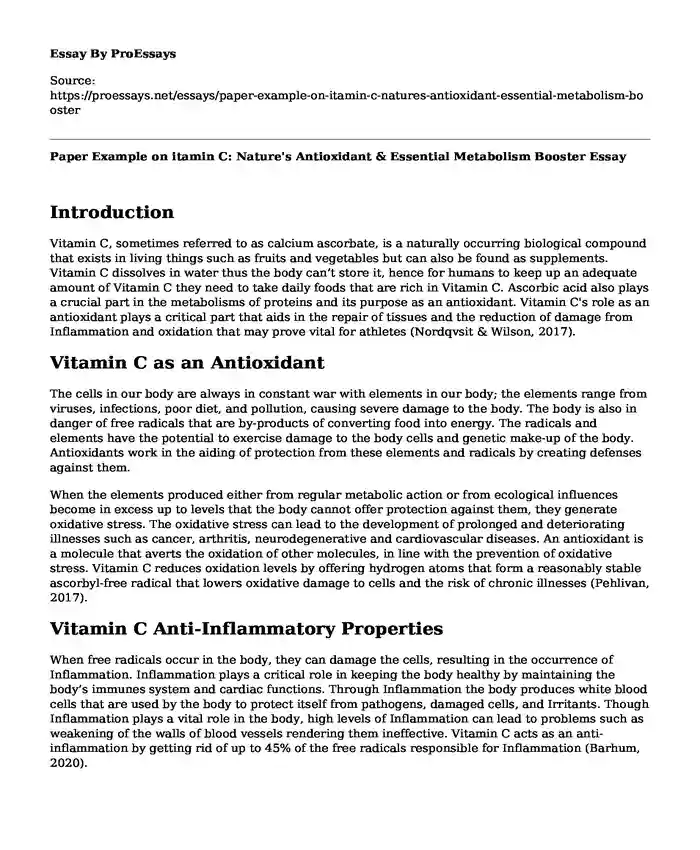Introduction
Vitamin C, sometimes referred to as calcium ascorbate, is a naturally occurring biological compound that exists in living things such as fruits and vegetables but can also be found as supplements. Vitamin C dissolves in water thus the body can’t store it, hence for humans to keep up an adequate amount of Vitamin C they need to take daily foods that are rich in Vitamin C. Ascorbic acid also plays a crucial part in the metabolisms of proteins and its purpose as an antioxidant. Vitamin C's role as an antioxidant plays a critical part that aids in the repair of tissues and the reduction of damage from Inflammation and oxidation that may prove vital for athletes (Nordqvsit & Wilson, 2017).
Vitamin C as an Antioxidant
The cells in our body are always in constant war with elements in our body; the elements range from viruses, infections, poor diet, and pollution, causing severe damage to the body. The body is also in danger of free radicals that are by-products of converting food into energy. The radicals and elements have the potential to exercise damage to the body cells and genetic make-up of the body. Antioxidants work in the aiding of protection from these elements and radicals by creating defenses against them.
When the elements produced either from regular metabolic action or from ecological influences become in excess up to levels that the body cannot offer protection against them, they generate oxidative stress. The oxidative stress can lead to the development of prolonged and deteriorating illnesses such as cancer, arthritis, neurodegenerative and cardiovascular diseases. An antioxidant is a molecule that averts the oxidation of other molecules, in line with the prevention of oxidative stress. Vitamin C reduces oxidation levels by offering hydrogen atoms that form a reasonably stable ascorbyl-free radical that lowers oxidative damage to cells and the risk of chronic illnesses (Pehlivan, 2017).
Vitamin C Anti-Inflammatory Properties
When free radicals occur in the body, they can damage the cells, resulting in the occurrence of Inflammation. Inflammation plays a critical role in keeping the body healthy by maintaining the body’s immunes system and cardiac functions. Through Inflammation the body produces white blood cells that are used by the body to protect itself from pathogens, damaged cells, and Irritants. Though Inflammation plays a vital role in the body, high levels of Inflammation can lead to problems such as weakening of the walls of blood vessels rendering them ineffective. Vitamin C acts as an anti-inflammation by getting rid of up to 45% of the free radicals responsible for Inflammation (Barhum, 2020).
How Vitamin C Can Be Beneficial to an Athlete
When an athlete engages in sporting activities, there is a high chance that he/she might get injured in various ways, such as scraping a knee or spraining an ankle that might lead to Inflammation. When Inflammation occurs, protective blood cells are produced and directed into the tissue to offer protection against the harmful radicals. This process increases blood flow into the area affected, and chemicals from the white blood cells result in fluids leaking in the tissue, thus causing redness and, consequently, swelling. The swelling may activate the nerves and lead to pain and discomfort.
As an antioxidant, vitamin C may help an athlete reduce the effects of muscle damage after an injury or fatigue due to vigorous exercise or training. Vitamin C also takes part in the formation of collagen responsible for the establishment of connective materials such as tendons, muscles, skin, bones, and blood vessels, among many more. Vitamin C from research has proven to be an essential factor in athletes' lives and should be incorporated into the diet of every athlete (Chambial et al, 2013).
References
Barhum, L. (2020). What Vitamins Can Help With Inflammation? Very Well Health.
Chambial, S., Dwivedi, S., Shukla, K., John, P., & Sharma, P. (2013). Vitamin C in disease prevention and cure: an overview (28 ed., Vol. 314). Indian J Clin Biochem. doi:10.1007/s12291-013-0375-3
Nordqvsit, J., & Wilson, D. R. (2017, April 10). Vitamin C: Why is it important. Medical News Today.
Pehlivan, F. E. (2017). Vitamin C: An Antioxidant Agent. Istanbul: Intech open. doi:10.5772/intechopen.69660
Cite this page
Paper Example on itamin C: Nature's Antioxidant & Essential Metabolism Booster. (2023, Sep 23). Retrieved from https://proessays.net/essays/paper-example-on-itamin-c-natures-antioxidant-essential-metabolism-booster
If you are the original author of this essay and no longer wish to have it published on the ProEssays website, please click below to request its removal:
- Essay on Health Benefits of Organic Food and Counter Argument
- Ethics Review: Bioethicists and Ethical Principles Paper Example
- Codeine and Human Genetics
- Speech Example on Should Health Insurance Providers Offer Free Birth Control
- Essay Example on Blood Cancers: Understanding Hematological Cancers & Its Effects
- Essay Example on Leveraging Global Markets with Tech & Virtual Health: Healthcare Evolves
- Essay Example on Human Circadian Rhythms







